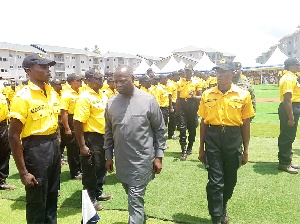- Home - News
- Elections 2024
- News Archive
- Crime & Punishment
- Politics
- Regional
- Editorial
- Health
- Ghanaians Abroad
- Tabloid
- Africa
- Religion
- Photo Archives
- Press Release
General News of Tuesday, 15 April 2025
Source: www.ghanawebbers.com
Navy trains 453 Blue Guards to protect our water bodies
Mr. Armah Blay Inspects the Parade
A total of 453 Blue Guards graduated in Jomoro, Western Region. They will be deployed to protect local water bodies from illegal mining. After two weeks of training by the Ghana Navy, they gained essential skills. These include physical endurance, arms handling, combat techniques, survival swimming, and boat operations.
At the ceremony, Minister for Lands and Natural Resources Emmanuel Armah Kofi Buah spoke about a new era in fighting illegal mining. He praised the precision and discipline shown during drills at the Naval Base over four weeks.
"You have been equipped with essential skills," he said. "Your perseverance deserves commendation; let’s applaud your dedication." The Minister reminded them that their training was not just for personal growth but to protect national resources.
The Water Guards come from riverine communities and play a critical role. "You are the eyes and ears of our defense," he stated. They will work with local leaders to safeguard waters against illegal mining.
Their duty is to observe, report, and escalate threats to the Ghana Navy Riverine Command Centers quickly. The Minister emphasized their commitment to professionalism through a signed Code of Conduct.
Any breach of this code will lead to strict penalties. "The future of our water bodies depends on your discipline," he warned.
Under Ghana Navy command, Blue Water Guards will act as an Early Warning Mechanism. Temporary Operational Bases (TOBs) are set up along key rivers for rapid response.
Through coordinated patrols and intelligence-sharing with security agencies, Minister Buah expressed optimism about deterring illegal activities. The Water Guards will operate in teams for effective command and control.
They will provide daily reports and quarterly evaluations through the Ghana Navy to ensure accountability. Additional speedboats and vehicles will be procured to extend this program into other regions.
This initiative aims not only to protect the environment but also create 2,000 direct jobs for Ghanaians. It is part of a broader strategy to reform Ghana’s mining sector.
Minister Buah warned those behind illegal mining activities: “Desist immediately or face legal consequences.” He assured that law enforcement would act swiftly against offenders.
CEO of Minerals Commission Martin Kweku Ayisi lamented that galamsey has poisoned rivers across Ghana. He noted that short-term greed is destroying both the environment and community futures.
"This crisis threatens public health and livelihoods," he said, highlighting evidence of pollution affecting access to clean water for communities.
Farmers struggle with irrigation while fishermen return with empty nets from polluted rivers. Ayisi stressed that degradation undermines food security and economic stability.
"We can no longer stand idle as our rivers run brown," he urged action now—decisive and collective efforts are needed from all citizens.
While government leadership is vital, Ayisi insisted policy alone won't win this battle; it requires everyone's commitment—including traditional leaders' involvement.
"Protecting our water resources is a duty we owe future generations," he concluded at the ceremony attended by various dignitaries including Deputy Defense Minister Brogya Gyamfi.











